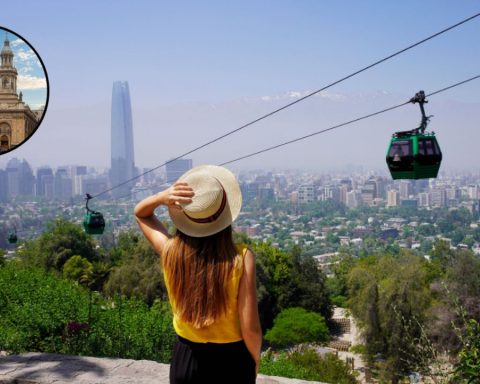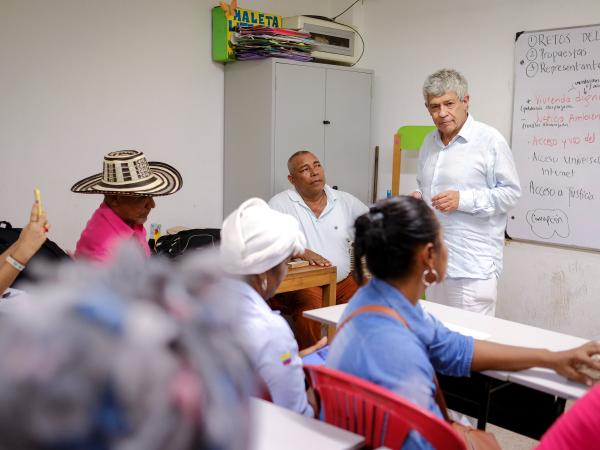Almost two months after the exit plebiscite –when Rejection categorically prevailed over Approval–, the right wing went from the electoral triumphalism of the beginning to the realization that the campaign promise of Rejection for a new and better Constitution would not more than deepening the internal problems, becoming a shirt of 11 yards and where the fierce opposition to the Government is no longer enough to have the sector cohesive.
And it is that, while the parties that make up Chile Vamos –UDI, RN and Evópoli– have been forced to fulfill their commitment to put a tombstone on the Constitution of 1980, the discomfort of a sector of their militancy has manifested itself by questioning the leadership of those who have so far led the negotiation instance with the ruling party: senators Javier Macaya (president of the UDI), Francisco Chahuán (helmsman of RN) and the outgoing president of Evópoli, Luz Poblete.
Apart from these questions, analysts agree in warning of the existence of emerging opposition sectors that have been noted, for example, in the last elections in Evópoli, where Gloria Hutt was elected as president of the community in the context of a meager turnout. , barely 8% of their electoral roll. The foregoing could be a sign that Chile Vamos has so far not managed to achieve the necessary cohesion to become a block opposed to the Government that emerges as an influential sector and, faced with this risk, the Republican Party and the PDG seem to threaten as convening spaces for that sector of the right that does not believe a constitutional change is necessary.
In this regard, the political scientist and academic of the Adolfo Ibáñez University, Cristóbal Bellolio, believes that “sectors such as the PDG and the Republican Party symbolize the toughest position against the continuity of the constituent process, which finds an echo in the bases of the parties In other words, the real distinction here has to do with the way in which opinion is distributed within the right-wing parties, where I get the impression that the leadership of these parties are the ones that understand that we must go ahead with the constituent process, and the bases are those who, perhaps intoxicated by the triumph of the Rejection in the exit plebiscite, assume this as a triumph of the ideas of the right, which is obviously a mistake, because the Rejection won despite the right and not thanks to the right.”
As Bellolio complements, Chile Vamos is betting an important part of its capital on the operation of its strategy in favor of a new Fundamental Charter, because, although they warn that said design could cause discomfort among a sector of its militancy, refusing to continue the process constituent would be, thinking in the medium and long term, a bad idea. This, because the directors of the UDI, RN and Evópoli would understand that in the face of any future social upheaval, it is very likely that the 1980 Constitution will once again be on the “defendant’s dock”, for which it is essential for them to overcome said discussion. .
In this sense, the senator and president of the UDI, Javier Macaya, distances himself from the role that the emerging opposition parties have played. “Neither the Republican Party nor the PDG are part of our coalition. Each sector has the right to do politics as it sees fit. Obviously we have differences with the manner of these sectors that are not part of Chile. Come on, but they have every right to do politics as they see fit. They are part of the opposition, but with a different coordination; we are responsible for the actions of Chile Vamos”, states the parliamentarian.
The risk of Chile Let’s face the incipient “new right”
Although the helmsmen of the parties of the main right-wing coalition say they are cohesive, bidding for the advancement of the constituent dialogue and expectantly facing the possibility of assuming the presidency of both Chambers of the National Congress, given the eventual fall of the administrative agreement in the Lower House, the truth is that each of its communities lives complex realities.
From the UDI, Senator Macaya has had to face harsh criticism in his role in promoting a new Magna Carta, evidencing a leadership that, for some union representatives, distances itself from its ideological foundations, considering that said party was founded by the late former senator and close collaborator of the dictatorship of Augusto Pinochet, Jaime Guzmán, who was also one of the authors of the 1980 Constitution and its complementary laws.
In Renovación Nacional, on the other hand, they go through a complex internal panorama, with the division between the sector that accompanies the current helmsman, Senator Francisco Chahuán, and the group close to the former minister of the Government of Sebastián Piñera and former presidential candidate, Mario Desbordes. All this, unleashed after the president of the Youth of RN, Javier Molina, was asked to resign, after knowing his quality as accused of crashing while intoxicated last July. In this regard, Molina – who is close to Desbordes – accused the existence of a “political operation” to remove him from his position, which has caused tension within the party.
Evópoli, meanwhile, called internal elections last Sunday to elect the new board of directors, whose presidency was disputed by Senator Luciano Cruz-Coke and the former minister of Sebastián Piñera, Gloria Hutt. It was finally Hutt who prevailed in the elections, but what caught the attention was the very low participation of the militancy, where only 1,400 people voted out of a total of 17,500 militants, which corresponds to only 8% of the electoral roll. Could this be a sign of discomfort in a sector of Chile Let’s go with the actions of its leaders? Or is it just a sign of disinterest in political discussion?
Faced with these questions, the deputy from Evópoli, Francisco Undurraga, told The Counter at La Clave that the low turnout in said instance was due “to the state in which we find ourselves, both as a party and as a political class in general, since neither in the rest of the communities is there a high turnout of their militants in this type of election, which which does not justify that there is obviously a disconnection between the party’s own leadership and the bases, and that is why people are clearly not participating.
In this context, understanding that Chile Vamos could pay its own costs for its bet in favor of a new Constitution, which would even go against its own political history and the thinking of its base of militants, new spaces of representation seek to deliver a a sign of independence, displaying a discourse that incorporates citizen demands, such as greater security and better management of the Government in economic matters. It is about that “new right”, which finds in the Republican Party and in the PDG platforms with the right to speak and vote in Congress, and who have become convinced of their empowerment after the triumph of the Rejection.
Precisely, and in relation to this scenario, the political analyst and academic from the University of Talca, Mauricio Morales, points out that “the right has a serious problem of understanding the facts. The longer the decision on the rules of the new constitutional process takes, , more prominence will be achieved by new parties that, in their eagerness to tune in with citizen demands, are pressing for a plebiscite. This applies to both the PDG and the Republicans. Except for Mario Desbordes, the right still feels that it is the repository of a victory that It does not belong to it at all –in fact, its leadership had to hide to allow the Rejection to triumph– If the right persists in this spirit of presenting itself as a veto player, it will pay a high cost and will hand over protagonism to both the PDG and the to Republicans.”
That is why, in the heat of the constituent debate, which has not yet managed to summon the necessary consensus to fasten an agreement, the sweet taste of the triumph of the Rejection begins to dissolve among a sector of the right that urgently seeks to articulate itself in the most cohesive way. possible, to do what is expected of an opposition, which is nothing more and nothing less than creating obstacles to the governability of the Executive, weakened after the defeat on September 4. However, each of the parties of Chile Vamos must deal with complex internal scenarios, face questions from their militancy, in addition to avoiding the empowerment of the Republican Party and PDG, whose sector could become the great winner of the political dispute in the sunset 2022.
















